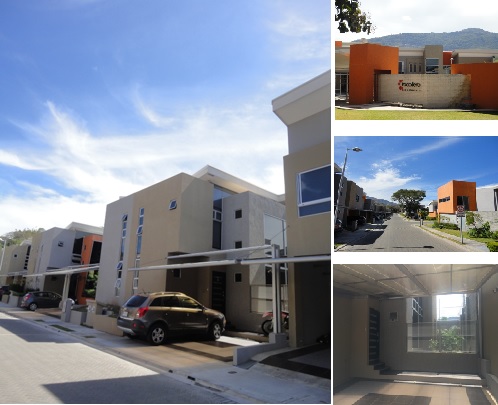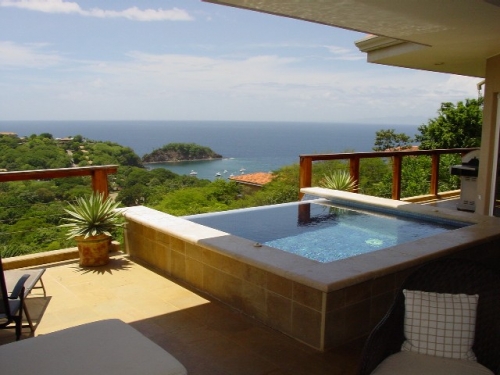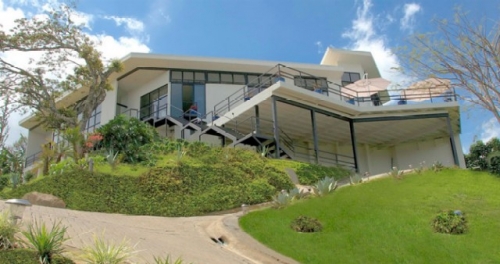Costa Rica Guide
Costa Rica Real Estate
List your property today!
Inclusion of real estate listings at Costa Rica Guide is
absolutely free of charge.
Featured Properties
Costa Rica Guide - Costa Rica Real Estate
Buying Process - Real Estate Information
Estate Planning in Costa Rica
By Thomas A. Burke, Attorney at Law
Preparing for an orderly succession, as the probate process is designated in Costa Rican civil code, is something that many thoughtful investors inquire about before purchasing real estate in this country. Since we count our reader among this thoughtful sort, this article will address various possibilities in arranging for probation of your estate.
My standard advice to clients is to make provisions for Costa Rican assets in accordance with Costa Rican legal practices, handling them separately from overseas assets. In this case of wills, this means having a knowledgeable attorney draft a will in Spanish according to the Costa Rican civil code to cover all assets held in this country.
It is a mistake to rely on a foreign will, particularly one prepared in one of the countries with a Common Law tradition, such as the USA, and Canada, and so on. The legal formalities for a will in Costa Rica are so different that a foreign will is simply not recognized as a will by Costa Rican courts. Even if the will is probated in a foreign court, the procedural differences can thwart execution here. Contrary to what one might believe, neither foreign nor Costa Rican courts have shown a willingness to bridge the gap in these legal formalities.
The following condensed list of steps will give you an idea of what is involved in getting a foreign will executed in Costa Rica:
1. Obtain a judgment from probate court that recognizes as valid the conveyance
of the specific property in Costa Rica to the specific beneficiary (devisee, legatee,
heir).
2. Have that judgment certified by the issuing court.
3. Get that judgment authenticated by the nearest Costa Rican consul.
4. Have the judgment officially translated to Spanish and reauthenticated through
the Ministry of foreign Relations.
5. Have an attorney apply to the First Chamber of the Supreme Court of Justice for
recognition of the Foreign judgment through a process called exequatur.
6. Finally begin anew an abbreviated probate process in the civil court with territorial
jurisdiction over the real estate in question
Needless to say, in practice this procedure abounds with possibilities for confusion and delay, as well as greater expense, while local assets risk remaining in a "legal limbo" awaiting the completion of this bureaucratic process. This situation can be avoided to a great degree by following my "standard" advice - provide estates in different countries separately, such that each group of assets is handled locally with as little complication as possible.
Before beginning this process, you should be aware that Costa Rican civil code already makes provision for the most common cases by establishing an order of heirs. First in line are spouses and children, who by law and to the exclusion of all others, inherit the entire estate. The successive orders of inheritance then go on from surviving parents to lesser degrees of kinship and finally to the local Board of Education by default. This, coupled with the legal principle that an estate is deemed to be accepted by the heirs only to the extent that it has a positive net worth, coincides with the most common desires in disposition of estates.
The problem lie in how to ensure a different, earlier, or conditional distribution of the estate. There are several possibilities in Costa Rica.
LAST WILL AND TESTAMENT (TESTAMENTO IN SPANISH)
This option can take one of several forms under civil code law, such as the following:
1. an open will drafted by an attorney in a notarial protocol book with three witness,
two of whom must speak the language of the devisor (person making the will) if that
language is not Spanish.
2. a handwritten and sealed will deposited with and certified by an attorney-notary
public.
3. an open will with six witnesses, or with four witnesses when handwritten by the
devisor.
4. wills given legal status due to emergency situations.
In practice, option 1 is most frequently used because it includes legal advice,
greater privacy through fewer witnesses, and security through registration in the
National Archives. This of course, implies a court probate procedure, which can
be shortened and handled privately with court permission if all of the heirs are
of legal age and of one accord.
LIVING TRUST (FEDEICOMISO IN SPANISH)
This identical for practical purposes to the Common Law concept, whereby assets are placed in the care of one or more trustees who are legally bound t manage the trust assets according to the conditions of the trust agreement, once the trustor passes away, to profit the beneficiaries. Assets can thus be transferred while you are in good health and under conditions that will not vary once you pass away or at the whim of the beneficiaries.
STOCK-HELD CORPORATION (SOCIEDAD ANONIMA IN SPANISH)
Another conventional measure is to transfer a stock-held corporation to the control of heirs upon the passing away of the owner/s by means of a preassignment of the stock. This option, however, requires extra precautions in Costa Rica. Since "Bearer Shares" are not allowed in Costa Rican corporations, a written assignment contract must be signed by the owner of the stock and the beneficiaries of the stock assignment. The trick is to ensure that the contract will pass into the hands of the heirs once the original stockholder passes away, and not before, since they could take control of the corporation prematurely. It is a matter of who you can trust and how much.
BARE LEGAL TITLE (NUDA PROPIEDAD IN SPANISH)
this is a very convenient way of transferring title to real estate while you are in good health and so that you retain beneficial use (usufructo) for the duration of your life. This is very easy and safe when dealing with property that you desire to enjoy and use during life, but that you also wish to transfer, whether gratuitously or for a PRICE, to the beneficiary prior to your death. The holder of the bare title in this case cannot interfere with the reasonable use of the property. By mutual agreement, it is still possible to dissolve this arrangement and otherwise dispose of the property should this be desirable in the future.
FOUNDATIONS OR OTHER NONPROFIT ORGANIZATIONS (FUNDACIONES OR ASOCIACIONES IN SPANISH)
Real estate can also be willed to nonprofit institution, although this is obviously more appropriate for large estate when you have a specific purpose in mind.
Finally, as a reminder to our readers, it is always advisable to ask an attorney for a list of his or her references before actually choosing any of the above options. Embassies usually offer a list of reputable local attorneys and consular services for preparation of wills.
About the author: Thomas A. Burke is a member of the Costa Rican Bar Association, with years of experience in investment consulting and business administration in Costa Rica. He speaks fluent English, Spanish, German, and French.
Please contact the author to obtain professional Costa Rica real estate legal advice.
Copyright 1996-2004
Note: The above information is not to be used for any other purpose other than private study, research, criticism or review. Thank you.






